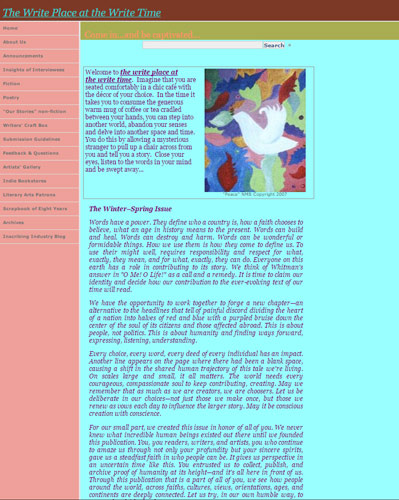The Write Place at the Write Time – Winter/Spring 2017
The Winter/Spring Issue of The Write Place at the Write Time reminds us of the power of words in the Editor’s Note: they can comfort and create, and they can dismantle and harm. This issue achieves the former, providing readers with a place to chill out, unload, and just read. The editors go above and beyond as they create an issue filled with timely poetry, prose, interviews, and more.
The Winter/Spring Issue of The Write Place at the Write Time reminds us of the power of words in the Editor’s Note: they can comfort and create, and they can dismantle and harm. This issue achieves the former, providing readers with a place to chill out, unload, and just read. The editors go above and beyond as they create an issue filled with timely poetry, prose, interviews, and more.
Starting in poetry, Mary K. O’Melveny gives us a piece to relate to in “Woodstock Christmas Eve 2016,” the speaker feeling weary from the news, which often seems more bad than good:
[ . . . ]
so grim I decide to
go back to my bed
to seek the comfort of
my very worst nightmares.
When keeping up with current events—especially now—sometimes we are left seeking balance between staying informed and staying hopeful about the world around us. O’Melveny does give us hope, though, found in the flash of red of a cardinal at the bird feeder. With hope we can keep going.
Working as a recap and as a call to arms to continue fighting, “The Women’s March: January 21, 2017” by Rochelle Jewel Shapiro “stitch[es] / together a coalition of citizenry,” those of us who are disabled, who are not, who wear a hadjib, a sheitel, a pink-eared wool hat, and men as well, all coming together to be indivisible as we and Shapiro ask, “Who among us can settle for a walled heart?” We can’t, but we can fight back with our words and with others at our sides.
In fiction, Joshua Shapiro’s “Shells” gives us the perfect amount of words. As the main character searches for conch shells for Elf, his daughter, we are given just hints and glimpses of a feeling of unrest, which he finally, briefly reveals later in the piece. For the majority of the story, though, we don’t know what’s going on—sickness, death, a custody battle—but we don’t have to, just like the woman who meets him and helps him search for seashells doesn’t have to know. She wants to help regardless and it’s what she doesn’t say that ends up helping the man: “Then she does a sympathetic thing, exactly what he needs at the very moment he needs it. She leaves.”
While the fiction and poetry are enjoyable, the nonfiction “Our Stories” section really won my heart this issue. In “Unclaimed” Toti O’Brien reels readers in with the very first line: “When the ambulance picked up my son at the skate park I did not hear the sirens, of course. I was miles away.” What follows is the almost panic-inducing story of O’Brien’s son experiencing extreme pain that O’Brien desperately wishes she can take away. As readers, we feel as helpless as she does while she tries to learn what’s going on and how to fix it. It’s her own pain that ends up grounding her later, a strong ending to bookend the piece’s strong beginning as it leaves readers with something to think about.
Lois Greene Stone takes us back in time to the “Happy Days generation” in “Sorority.” Frustrated with exclusion and discrimination after rush week in college, Greene Stone creates a “non-sectarian, interracial unit” in the dorms and reaches out to others in an attempt to make inclusion in sisterhood—despite race or religion—a normal thing. Eleanor Roosevelt is one of the people she contacts, and she actually visits: “There were no bodyguards when she got off the train, and she ate in our dorm’s dining room, accepted an honorary pin, and I so expected society would suddenly change.” Of course it doesn’t; a Women’s March in 2017 shows change is a slow process, but Greene Stone shares her perspective, comparing society to the change in postage stamps from a bitter taste to easy stickers:
We all make a difference and don’t need a bitter taste of life left in our mouths to try and make something stick; with a direct, simple yet solid effort, the newly affixed stamp of belief or support can stay in place, delivering us into new territory.
Just like Rochelle Jewel Shapiro’s poem, Greene Stone reminds us to keep applying effort as we bring about change.
If readers are still hungry for words after reading the poetry and prose this issue, there’s an interview section and the “Writer’s Craft Box” section with a fun challenge for writers and thoughts on writing and reading. Again, in this section, the editors reiterate: “Writing is art and art is supposed to be fun, relaxing, healing and nurturing.” So is reading, which this Winter/Spring 2017 issue of The Write Place at the Write Time reminds us. Words have the power to build or break, and in this issue, they successfully and powerfully reenergize and mend.
[http://www.thewriteplaceatthewritetime.org]






